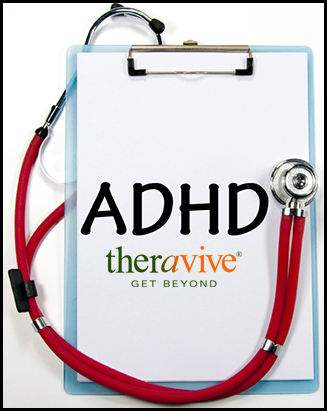 Attention Deficit Hyperactive Disorder, better known as ADHD, is a disorder that many people in the United States have to deal with on a regular basis. Whether you're an adult that didn't get treated as a child, an adult that developed adult onset ADHD, or you have a child that has ADHD, there are a lot of things that you need to do in order to deal with the disease in a way that is effective and helps you or your child work through life in the way that they were intended to.
Attention Deficit Hyperactive Disorder, better known as ADHD, is a disorder that many people in the United States have to deal with on a regular basis. Whether you're an adult that didn't get treated as a child, an adult that developed adult onset ADHD, or you have a child that has ADHD, there are a lot of things that you need to do in order to deal with the disease in a way that is effective and helps you or your child work through life in the way that they were intended to.
There are two main types of ADHD according to the most recent Diagnostic and Statistical Manual (the primary book that mental health professionals use for diagnosis). ADHD-I, or inattentive type, is what used to be referred to as ADD, and is all about difficulty with concentration and finishing tasks that they need to finish. ADHD-H, or hyperactive type, is the former "ADHD" diagnosis, and focuses on the inability to sit still or stop fidgeting. Both became "ADHD" in the most recent manual because, many times, those who had the ADD diagnosis had signs of hyperactivity and it seemed more fitting to combine the two together.
That being said, whether your child has ADHD-I or ADHD-H, it can be a difficult diagnosis to determine and work through. How can you make it easier on your family and your child? What can you do in order to make sure that they receive the care that they need and are able to succeed in their lives? Are there techniques that you can try? Absolutely! In today's blog post, we're going to take a look at all of the different things that you and your child can do in order to cope with an ADHD diagnosis in an effective manner.
How Do I Cope With My Child's Diagnosis?
First off, it may be hard for you at first. Since more and more children are getting some sort of ADHD diagnosis than ever before, you need to realize that you aren't alone. Some of your child's friends may be working through some of the same stuff, and you may be able to get advice from their parents to learn exactly what you can do to help them out. Look for a support system in the school or in your network of relationships. The support itself can be a huge catalyst for your child's success and for your own adaptations.
Remember, all children (well really, all people) are imperfect. We all have things that we have to work through and struggle with, and honestly, your child is among those "imperfect" beings. Just because there's a label for their imperfections doesn't make them any less awesome. By accepting imperfection, you will find that you are much more willing to offer grace when mistakes occur, and you will put a lot less pressure on yourself as well. You may make mistakes, yes, but that's absolutely fine - you will live and learn and you will all get through this rough patch together.
And remember - you didn't do anything wrong. You didn't do anything to cause your child to have ADHD, it's something that is ingrained in some people, and nothing that you did exacerbated it. You just have the responsibility of loving them and helping them to learn how to live in a way that helps push them to succeed in a good way. So don't beat yourself up - accept that it's a bump in the road, but they're still your child and you can all work through this thing together. Take it easy! There's no need to add additional stress.
By coping with the implications of ADHD yourself, you will find that it is much easier for you to help your family to work through it as well, especially the child(ren) that have the diagnosis. Be sure to communicate with your spouse, your child's teachers, and other people in your network in order to get the support that you need before you start doing what you can in order to make sure that your child is successful. This may even involve some counseling or classes on your own time - be willing to do what you can in order to help your child succeed.
 What Do I Do to Help My Child Cope with ADHD?
What Do I Do to Help My Child Cope with ADHD?
The good news is, as time has gone on, ADHD has become a lot more treatable and, with your willingness and help, your child can live a normal life that isn't super affected by the disorder. It will take some effort on your part, as we've outlined above, but you can get through it and, with some of these tips, you can make sure that your child is set up to live the best life that they can, even if they have both good days and bad days where they struggle with the symptoms of their ADHD.
Encourage them and believe in them, even if others may be trying to point out your child's faults more often than necessary. This is really hard when your child is in a school environment because you will get information from their teacher(s) that tells you about their struggles in school. You may hear that your child is developmentally behind or emotionally struggling, but honestly, they just think and work differently. It's that way, no matter what type of learning disability that they may be working through. So, instead of fretting about what others are saying about them, encourage your child and help them to learn in the way that is best for them. That's not to say that you should totally ignore some of the information you get - just don't be discouraged if you seem to be getting more negative than positive feedback about your child and their progress. Work with professionals to get done what needs to get done.
Don't be afraid to include medication in the treatment plan for your child - it can make a world of difference. This is something that a lot of parents have a hard time finding the balance with. Some parents say absolutely not to medicate, but other parents are way too willing to get their child "drugged up" so that they can function properly. You have to find a balance, and make sure that you are constantly communicating with your mental health professional or doctor when you're treating your child for ADHD. Some children (and adults!) do just fine without medicine, but in some cases, the medication can be the difference between functioning and doing well. If you want your child to succeed, make sure that you're talking to your medical professionals on a regular basis so that you can see what they suggest. Trust them! They know what they're doing and can help you make the best decisions for your child and the situation that they are currently in and working through at this time in their lives.
Be willing to sit down and work with them, discussing what is going on with their days and what they need help with. One thing that some parents forget to do is talk to their children about what is going on with them. Sometimes, we just throw words and letters at them but don't actually explain what they are and how those things can affect their lives. By being open and honest, not only will your child get a better understanding of what is going on with them and what they're doing in their life and in their head, they will have an easier time vocalizing and explaining what is going on with their minds. Be open and honest about what is going on with their medication and other things that may come up during treatment, and they will be more open with you if there is a problem that comes up or an issue that needs to be addressed in order for your child to succeed with their treatment plan.
Be patient and try to only employ "punishment" if absolutely necessary - discipline often works better, and it is a lot easier for an ADHD child to understand how to function if you are teaching them how to function instead of just pointing out what they're doing wrong. This is so hard, because so many times we just want to punish our children for "doing something wrong." But in the case of children who have ADHD, they may not understand what is going on or they simply may not realize that what they're doing is annoying, or wrong, or whatever else it may be. Instead of immediately punishing them, sit down and have a discussion with them. Talk to them about what is going on in their lives and why they did what they did. Yes, you can discipline them (if you don't, they may start to use their disorder as an excuse instead of learning from it), but you want to make sure that the communication is open so that they can become more aware of the things that they are doing and deal with it in a healthy manner, instead of just going back to it again. Patience is key here, and your patience can help them to learn how to adapt to the disorder more readily.
So, as you can see, there are a lot of things that you can do in order to make sure that you and your child can get through this diagnosis with as few interruptions as possible. In some cases, you may want to get the help of a therapist to work through some of the symptoms in a way that may or may not involve the use of medication. Be sure to use the resources that we have here on the website in order to find a therapist in your area that can help you, your family, and your child with this diagnosis.
_________________________________________________________________________________________________________________________________
Carpenter, D. (n.d.). 12 Parenting Strategies That Work for ADD Kids. Retrieved August 4, 2014, from http://www.additudemag.com/adhd/article/985.html
Engelgau, D. (n.d.). 2 Strategies to Help Parents of Kids with ADHD. Retrieved August 4, 2014, from http://health.howstuffworks.com/mental-health/adhd/twelve-strategies-to-help-parents-of-kids-with-adhd.htm
Kam, K. (2013, December 16). Parenting a Child With ADHD: Helping Your Child. Retrieved August 4, 2014, from http://www.webmd.com/add-adhd/childhood-adhd/features/6-parenting-tips-for-raising-kids-with-adhd
Smith, M., & Segal, J. (2014, June). ADD/ADHD Parenting Tips. Retrieved August 4, 2014, from http://www.helpguide.org/mental/adhd_add_parenting_strategies.htm
Tartakovsky, M. (2011). Parenting Kids with ADHD: 16 Tips to Tackle Common Challenges - Psych Central. Retrieved August 4, 2014, from http://psychcentral.com/lib/parenting-kids-with-adhd-16-tips-to-tackle-common-challenges/0006557
About the Author
 Marti Wormuth, MA
Marti Wormuth, MAMarti has a Bachelor’s Degree in Sociology and a Master’s in Communication Studies. Her favorite activities include reading, playing games, and hanging out with the students at her church. Marti volunteers with the youth ministry at her church as a teacher and mentor. Because of this, she recently started another degree, her graduate certificate in student ministries. She considers her current graduate work to be a stepping stone to becoming a youth pastor or a published author.
Professional Website:
martis-miscellany.com/